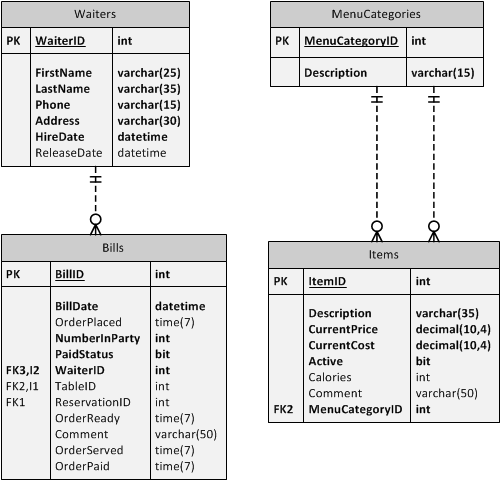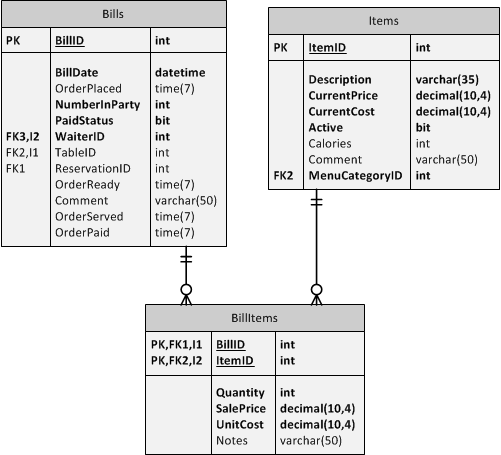# eRestuarant Practice - Solution

These classes are the final solution to the practice entities and the updated RestaurantContext. They include additional navigation properties to represent the complete set of relationships in the database. In addition, the BillItem entity for the BillItems table is provided as a post-practice demo.
# Coding the Entities
# The MenuCategory Class
The following is the entity for the MenuCategories table.
public class MenuCategory
{
public int MenuCategoryID { get; set; }
[Required(ErrorMessage = "A Description is required (5-35 characters)")]
[StringLength(35, MinimumLength = 5, ErrorMessage = "Descriptions must be from 5 to 35 characters in length")]
public string Description { get; set; }
public virtual ICollection<Item> MenuItems { get; set; }
}
# The Item Class
The Item entity below includes attributes that reflect the constraints and other table properties. Although a [Required] attribute was not technically needed for the MenuCategoryID, it has been included nonetheless so as to provide a descriptive reason for it being NOT NULL.
public class Item
{
[Key]
public int ItemID { get; set; }
[Required(ErrorMessage = "A Description is required (5-35 characters)")]
[StringLength(35, MinimumLength = 5, ErrorMessage = "Descriptions must be from 5 to 35 characters in length")]
public string Description { get; set; }
[Required(ErrorMessage="Current Price information is required")]
[Range(0.01, 50.00, ErrorMessage="Prices for menu items must be greater than zero and less than or equal to $50.00")]
public decimal CurrentPrice { get; set; }
[Required(ErrorMessage = "Current Cost information is required")]
[Range(0.01, 30.00, ErrorMessage = "Costs for menu items must be greater than zero and less than or equal to $30.00")]
public decimal CurrentCost { get; set; }
public bool Active { get; set; }
[Range(0, int.MaxValue, ErrorMessage="Calories noted for a menu item must be greater than or equal to zero")]
public int? Calories { get; set; }
public string Comment { get; set; }
[Required(ErrorMessage="Every menu item must be categorized")]
public int MenuCategoryID { get; set; }
public virtual MenuCategory Category { get; set; }
public Item()
{
Active = true;
}
}
# The Waiter Class
The Waiter entity has an additional property that is not mapped to a column in the database: FullName. The [NotMapped] attribute allows entities to contain extra properties not in the mapped table, thus allowing the entity to become a "richer" model in the application.
public class Waiter
{
public int WaiterID { get; set; }
[Required(AllowEmptyStrings=false), StringLength(25)]
public string FirstName { get; set; }
[Required(AllowEmptyStrings = false), StringLength(35)]
public string LastName { get; set; }
[Required(AllowEmptyStrings = false), StringLength(15, MinimumLength=4)]
public string Phone { get; set; }
[Required(AllowEmptyStrings = false), StringLength(30, MinimumLength=8)]
public string Address { get; set; }
public DateTime HireDate { get; set; }
public DateTime? ReleaseDate { get; set; }
[NotMapped]
public string FullName { get { return FirstName + " " + LastName; } }
// Navigation Properties
public virtual ICollection<Bill> Bills { get; set; }
}
# The Bill Class
Additional navigation properties are shown in this code sample that are not part of the practice: ICollection<BillItem> Items, Waiter and Table.
public class Bill
{
public int BillID { get; set; }
public DateTime BillDate { get; set; }
public DateTime? OrderPlaced { get; set; }
public int NumberInParty { get; set; }
public bool PaidStatus { get; set; }
public int WaiterID { get; set; }
public int? TableID { get; set; }
public int? ReservationID { get; set; }
public bool OrderReady { get; set; }
public string Comment { get; set; }
// Navigation Properties
public virtual ICollection<BillItem> Items { get; set; }
public virtual Waiter Waiter { get; set; }
public virtual Table Table { get; set; }
public Bill()
{
BillDate = DateTime.Now;
}
}
# Coding the Database Context
The complete database context for eRestaurant is as follows.
internal class RestaurantContext : DbContext
{
public RestaurantContext() : base("name=EatIn") { }
public DbSet<Table> Tables { get; set; }
public DbSet<SpecialEvent> SpecialEvents { get; set; }
public DbSet<Reservation> Reservations { get; set; }
public DbSet<Bill> Bills { get; set; }
public DbSet<BillItem> BillItems { get; set; }
public DbSet<Item> Items { get; set; }
public DbSet<MenuCategory> MenuCategories { get; set; }
public DbSet<Waiter> Waiters { get; set; }
protected override void OnModelCreating(DbModelBuilder modelBuilder)
{
modelBuilder
.Entity<Reservation>().HasMany(r => r.Tables)
.WithMany(t => t.Reservations)
.Map(mapping =>
{
mapping.ToTable("ReservationTables");
mapping.MapLeftKey("ReservationID");
mapping.MapRightKey("TableID");
});
base.OnModelCreating(modelBuilder);
}
}
# Post-Practice Demo
The BillItems table uses a Composite Key. In order to map that reality in our entity, we need to use the [Key] and [Column] attributes together.

The BillItem supports the following business rules:
- Quantity must be a minimum of 1 and maximum of 20.
- Sale price is between $0.00 and $50.00 inclusive.
- Unit cost is betwee $0.01 and $30.00 inclusive.
public class BillItem
{
[Key, Column(Order = 1)]
public int BillID { get; set; }
[Key, Column(Order = 2)]
public int ItemID { get; set; }
[Required(ErrorMessage="Quantity is required"), Range(1, 20, ErrorMessage="Quantity must be between 1 and 20")]
public int Quantity { get; set; }
[Required(ErrorMessage = "Sale Price is required"), Range(0.00, 50, ErrorMessage = "Sale Price must be between zero and $50.00 inclusive")]
public decimal SalePrice { get; set; }
[Required(ErrorMessage = "Unit Cost is required"), Range(0.01, 30, ErrorMessage = "Unit Cost must be between $0.01 and $30 inclusive")]
public decimal UnitCost { get; set; }
public string Notes { get; set; }
// Navigation Properties
public virtual Bill Bill { get; set; }
public virtual Item Item { get; set; }
}